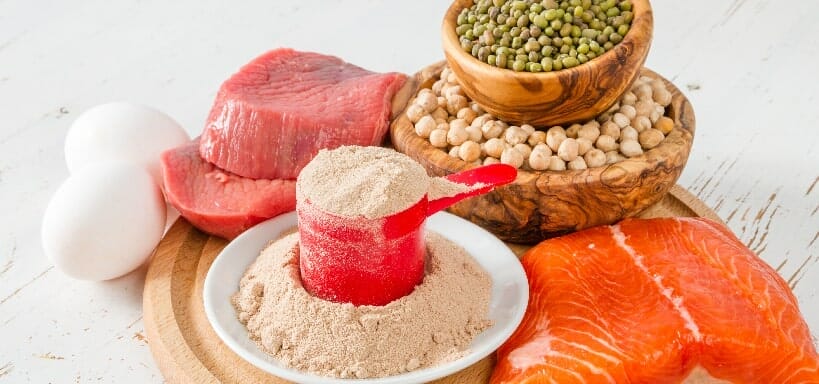Judging by all the bars, shakes and powders out there, you could be led to believe that you need a protein supplement. These products claim to curb appetite, help with weight loss and build muscle. But what’s the real story?
Contrary to all the hype that everyone needs more protein, most people in the U.S. meet or exceed their needs. This is especially true for males ages 19–59. The Dietary Guidelines for Americans, 2020–2025 indicate that men in that age range are exceeding their daily recommendations, especially from meat, poultry and eggs. Even athletes often get more proteins than they need without supplements because their calorie requirements are higher.
True or false? Big steak equals bigger muscles.
False. Although adequate protein throughout the day is necessary, extra strength training is what leads to muscle growth — not extra protein intake. You can’t build muscle without the exercise to go with it.
The body can’t store this nutrient, so once needs are met, any extra is used for energy or stored as fat. Excess calories from any source will be stored as fat in the body.
How much do you need?
Anywhere from 10% to 35% of your calories should come from protein. So if your needs are 2,000 calories, that’s 200–700 calories from protein, or 50–175 grams. The recommended dietary allowance to prevent deficiency for an average sedentary adult is 0.8 grams per kilogram of body weight. For example, a person who weighs 165 pounds, or 75 kilograms, should consume 60 grams of proteins per day.
Once you reach ages 40–50, sarcopenia, or losing muscle mass as you age, begins to set in. To prevent this and to maintain independence and quality of life, your protein needs increase to about 1–1.2 grams per kilogram or 75–90 grams per day for a 75-kilogram person.
People who exercise regularly also have higher needs, about 1.1–1.5 grams per kilogram. People who regularly lift weights, or are training for a running or cycling event need 1.2–1.7 grams per kilogram. Excessive protein intake would be more than 2 grams per kilogram of body weight each day.
If you are overweight, your weight is adjusted before calculating your protein needs to avoid overestimating. You can see a dietitian to help develop a personalized plan.
Where does protein come from?
The healthiest protein options are plant sources, such as soy, nuts, seeds, beans and lentils; lean meats, such as skinless, white-meat chicken or turkey; a variety of fish or seafood; egg whites; or low-fat dairy.
Meet your dietary protein needs with these whole foods versus supplements, which are no more effective than food as long as energy intake is adequate for building lean mass.
Manufactured foods don’t contain everything you need from food, and manufacturers do not know everything that should be in food.
When is the best time to consume protein?
General recommendations are to consume 15–30 grams of proteins at each meal. Studies show higher intakes — those more than 40 grams — in one sitting are no more beneficial than the recommended 15–30 grams at one time. Don’t waste your money on excessive amounts.
If you want to use a protein supplement, here’s what to look for:
- About 200 or fewer calories
- 2 grams or less of saturated fat
- No trans-fat or partially hydrogenated oils
- 5 grams of sugar or fewer
What does 15–30 grams of proteins in whole foods looks like?
Eating a banana, Greek yogurt and a hard-boiled egg will get you 19 grams of protein on average. A 3-ounce chicken breast with a half-cup rice and a half-cup of vegetables amounts to 25 grams protein. An egg and bean burrito with a glass of milk is about 28 grams of protein.
As you can see, it’s easy to get the recommended 15–30 grams per meal. Most people — even athletes — can reach their protein needs by including a serving of dairy at each meal and a piece of meat the size of a deck of cards at lunch and supper.
Proteins should accompany fruits, vegetables and whole grains. Protein should not be the entire meal. If you feel like you might have increased protein needs, consider adding more beans, lentils, soy or seafood rather than processed supplements.
Check out our blog post 8 Ways to Lose Belly Fat and Live a Healthier Life here!

